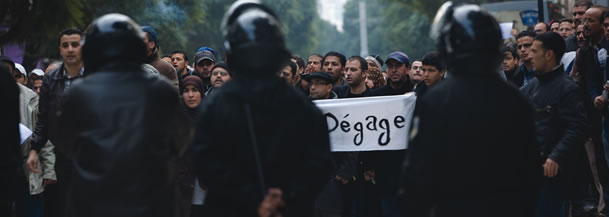Five Questions: Richard Norton on After the Arab Spring

Augustus Richard Norton is a Professor of International Relations and Anthropology at Boston University, where he is also the Director of the the Institute for Iraqi Studies. His books include Hezbollah, and Civil Society in the Middle East. Norton, who authored the Great Decisions 2012 Briefing Book article, "Middle East Realignment: The Arab Upheaval," spoke with FPA's online editorial assistant Sarah Marion Shore about recent developments in the region.
1. Can a revolution succeed in Syria, and will it be up to the international community to aid it?
I don’t think that the prospects for survival of the Syrian government are very high. But on the other hand, the opposition to the government is still really in a phase of organization. So I think what we’re seeing is a long process playing out, which may eventually include a Western and a U.S. role.
I think that the situation in Syria does not lend itself as well to intervention as the situation in Libya. Qaddafi was much more isolated and geographically intervention in Libya was much easier than it would be in Syria. One could not intervene from Israel for obvious reasons; the Iraqi flank of Syria is problematic; involving Lebanon would be extremely problematic, so really the only direction through which intervention would even be possible would be the Turkish side, and that requires of course Turkish acquiescence or participation, and Turkey’s position has been evolving.
2. Islamist groups have made significant gains in recent elections in Egypt, Tunisia, and Morocco. Will the U.S. be able to maintain relationships with governments of Islamist majority?
Number one I don’t think the U.S. has any choice. Given free elections, it’s likely that Islamists are going to be playing a major if not dominate role in all of these political systems. But I would add that the Islamists themselves have been evolving over time and there have been enormously important debates going on within these Islamist or Islamically oriented parties, which has made them more accepting and willing to embrace pluralist or democratic politics. So that in many ways, I think we can say that we’re not dealing with our father or mother’s Islamist. This is a new generation.
3. Does the U.S. have a strategy for dealing with Islamist governments?
We see a strategy evolving in Egypt I think, where we have the most venerable Islamist group, the Muslim Brotherhood, achieving a dominate position in the parliament. And there the U.S. has begun talking to the Brotherhood. It’s clear that a discussion with the Brotherhood is contingent on Egyptian adherence to the peace treaty with Israel for example. And from the Egyptian side of course their intent on continuing to receive U.S. assistance, which is valued at billions of dollars every year. So both sides have something to lose if this dialogue does not go forward, and I think the US has done a pretty good job of quietly laying out the parameters for the discussions.
4. Is there a role in Egypt for the young reformers who led the revolution? Will they be included in the government, and if not, will they once again take to streets?
I think that we’re already seeing evidence of the disappointment of the young reformers. The irony is the quality that made these young reformers who populated Tahrir Square and really inspired so many people around the world was the fact that they were not centrally organized, that this was a very horizontal form of organization, facilitated by social media, and so on. But that may have helped in the context of toppling the Mubarak government, but on the other hand it doesn’t necessary lend itself very well to effective political participation. So really their role in the new parliament is going to be I think disappointingly minimal... I don’t quite think this is a revolution. Because in a revolution the established regime is basically replaced, and in this case the established regime is being modified, rather significantly, but nonetheless major elements of the former regime, not least the military, very much are going to retain their power I believe.
5. Finally, with military drawdown from Iraq and a renewed focus on Asia, will U.S. disengage from the region in coming months, or remain committed?
I think that there are three, maybe four elements that ensure continuing U.S. commitment. One is the stuff that you and I both put in our automobiles, which is to say the oil supplies in the region, which are strategically important for the world, not just for the U.S. So this will ensure a continuing focus on the areas of the region particularly that are rich in petroleum, most certainly the Gulf and North Africa, but also Egypt and, in the near future, the offshore areas of Israel and Lebanon. Number two of course, the U.S. has a very close, some would argue too close, relationship with Israel, and that will keep the U.S. involved. Number three, the U.S. is interested in the region in terms of ensuring that geopolitical rivals, like Iran, and extra-regional rivals, like China and Russia and so on, do not attain influence there or superior influence. So I think that will maintain the U.S. role. And last, I do think that the U.S. has a particular interest in helping to ensure the so-called “Arab Spring” democratization movements achieve some success and also avoid collapsing into pandemonium, which continues to be a possibility in Libya and in Syria where the stakes are very high indeed.

Buy the Great Decisions 2012 Briefing Book





